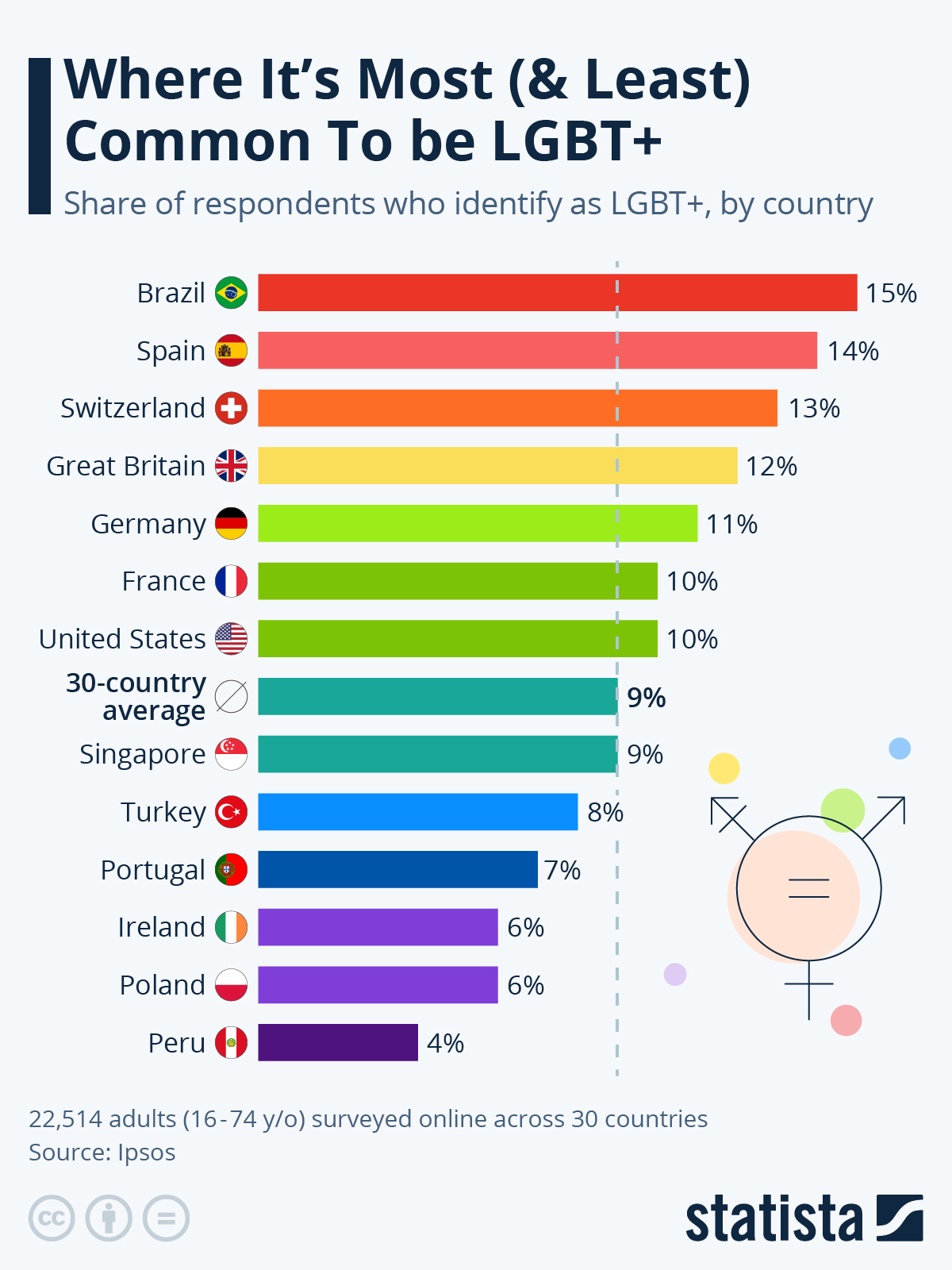
Nine percent of adults identify as LGBT+, according to a 2023 survey conducted online in 30 countries by Ipsos for Pride month.
In this survey, LGBT+ includes people who identify as Lesbian/gay/homosexual, Bisexual, Pansexual/omnisexual, Asexual, Transgender, Non-binary/gender non-conforming/gender-fluid and Other than male or female.
As Statista's Anna Fleck shows in the following chart, there’s notable variation between countries.
You will find more infographics at Statista
Brazil has the highest share of people identifying as LGBT+, at 15 percent while Spain comes in a close second place with 14 percent of adults, followed by Switzerland (13 percent), Great Britain (12 percent) and the Netherlands (12 percent). Spain is the country where respondents were most likely to say they are gay or lesbian (6 percent) while Brazil and the Netherlands were where the highest share of respondents said they are bisexual (7 percent both).
Meanwhile, the United States comes in just above the 30-country average of 9 percent, with 10 percent of adults saying they identified as LGBT+ in 2023.
When looking at sexual orientation in the U.S., 3 percent of respondents identified as gay, 5 percent as bisexual and one percent pansexual or omnisexual.
At the lower end of the spectrum comes Ireland and Poland with 6 percent of adults identifying as LGBT+ in each. This contrast is somewhat surprising considering the countries’ vastly different stances on LGBT+ rights. Where Ireland legalized gay marriage in 2015 by popular vote with a landslide victory of 62 percent (versus only 38 percent no), Poland has seen a downturn of LGBT+ rights in recent years, with dozens of municipalities even declaring themselves so-called “LGBT-free zones”. Peru had the lowest share of people saying they were LGBT of the surveyed countries at only 4 percent.
There was also considerable variation across age groups: across the 30-country average, 18 percent of Gen Zers self-identified as LGBT+ population versus 10 percent of Millennials, 6 percent of Gen Xers and only 4 percent among Baby Boomers.
Nine percent of adults identify as LGBT+, according to a 2023 survey conducted online in 30 countries by Ipsos for Pride month.
In this survey, LGBT+ includes people who identify as Lesbian/gay/homosexual, Bisexual, Pansexual/omnisexual, Asexual, Transgender, Non-binary/gender non-conforming/gender-fluid and Other than male or female.
As Statista’s Anna Fleck shows in the following chart, there’s notable variation between countries.
You will find more infographics at Statista
Brazil has the highest share of people identifying as LGBT+, at 15 percent while Spain comes in a close second place with 14 percent of adults, followed by Switzerland (13 percent), Great Britain (12 percent) and the Netherlands (12 percent). Spain is the country where respondents were most likely to say they are gay or lesbian (6 percent) while Brazil and the Netherlands were where the highest share of respondents said they are bisexual (7 percent both).
Meanwhile, the United States comes in just above the 30-country average of 9 percent, with 10 percent of adults saying they identified as LGBT+ in 2023.
When looking at sexual orientation in the U.S., 3 percent of respondents identified as gay, 5 percent as bisexual and one percent pansexual or omnisexual.
At the lower end of the spectrum comes Ireland and Poland with 6 percent of adults identifying as LGBT+ in each. This contrast is somewhat surprising considering the countries’ vastly different stances on LGBT+ rights. Where Ireland legalized gay marriage in 2015 by popular vote with a landslide victory of 62 percent (versus only 38 percent no), Poland has seen a downturn of LGBT+ rights in recent years, with dozens of municipalities even declaring themselves so-called “LGBT-free zones”. Peru had the lowest share of people saying they were LGBT of the surveyed countries at only 4 percent.
There was also considerable variation across age groups: across the 30-country average, 18 percent of Gen Zers self-identified as LGBT+ population versus 10 percent of Millennials, 6 percent of Gen Xers and only 4 percent among Baby Boomers.
Loading…






